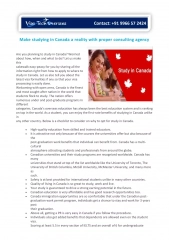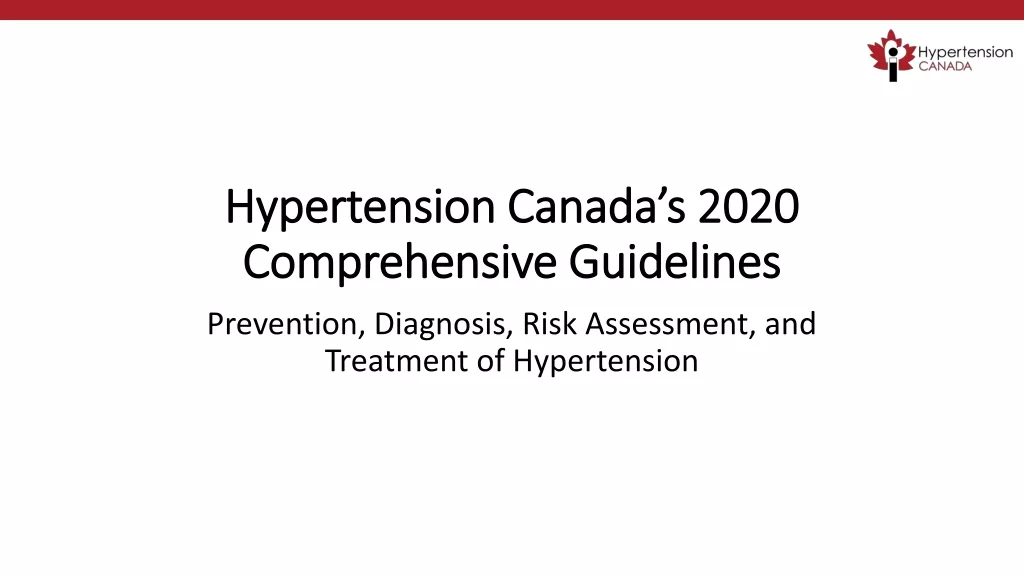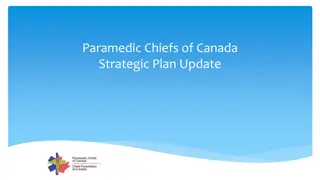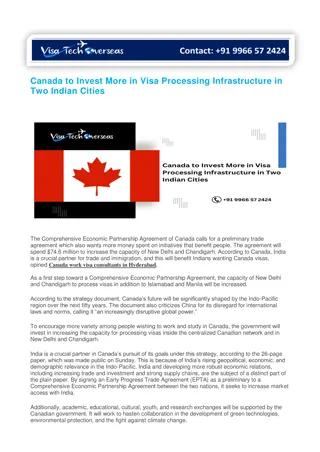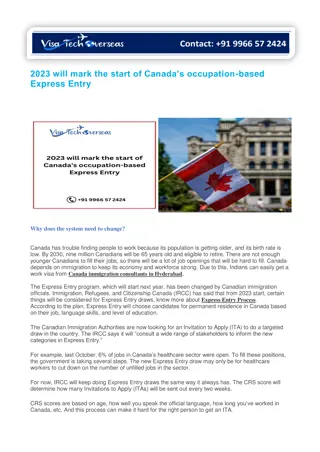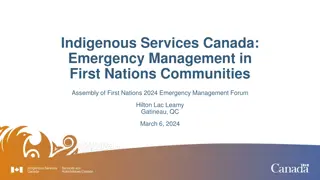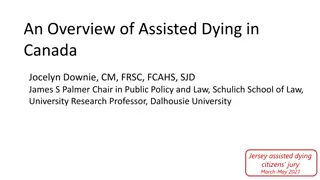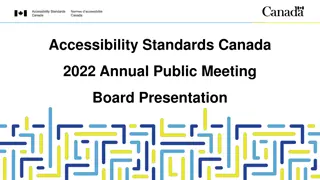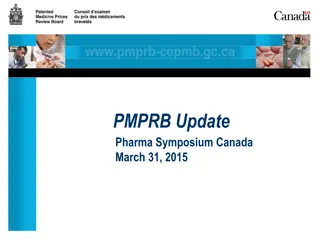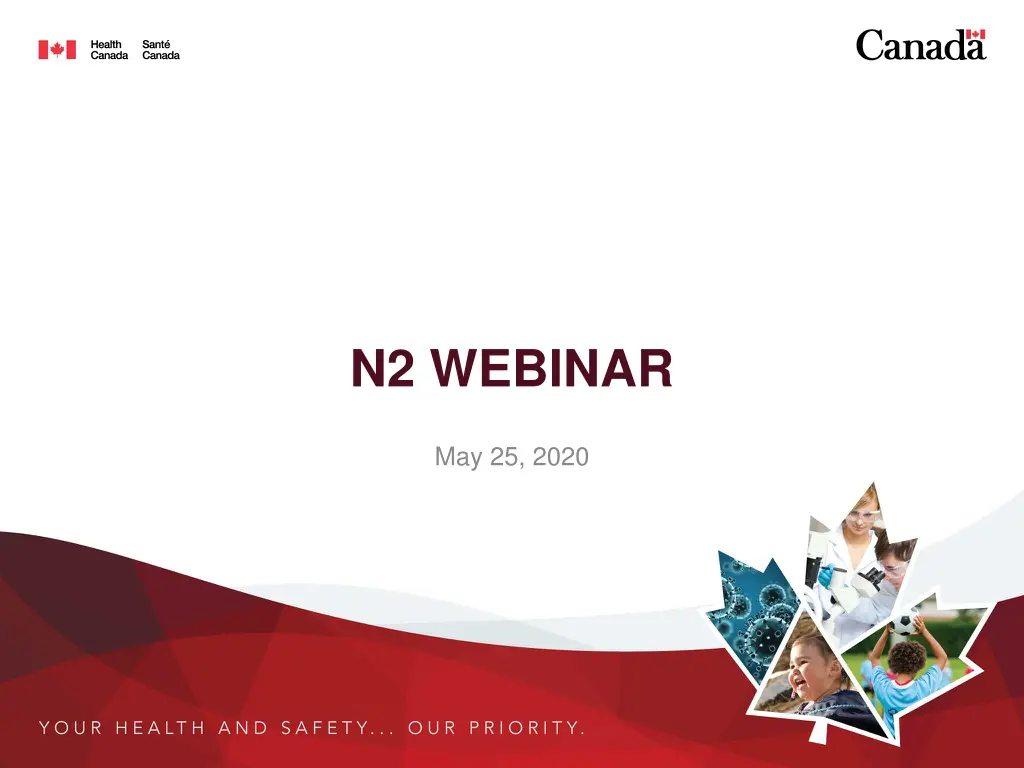
Health Canada's Responses to Pandemic Impact on Clinical Trials Process
"Discover how Health Canada is addressing challenges in clinical trials due to the pandemic, including prioritizing COVID-19-related requests, changes in pre-CTA meetings, application processes, and consent procedures."
Download Presentation

Please find below an Image/Link to download the presentation.
The content on the website is provided AS IS for your information and personal use only. It may not be sold, licensed, or shared on other websites without obtaining consent from the author. If you encounter any issues during the download, it is possible that the publisher has removed the file from their server.
You are allowed to download the files provided on this website for personal or commercial use, subject to the condition that they are used lawfully. All files are the property of their respective owners.
The content on the website is provided AS IS for your information and personal use only. It may not be sold, licensed, or shared on other websites without obtaining consent from the author.
E N D
Presentation Transcript
N2 WEBINAR May 25, 2020
Overview Health Canada is aware of the impact of the pandemic on the conduct of clinical trials: The need for participants to self-isolate deployment of healthcare personnel involved in clinical trials to other duties during this public health emergency, resulting in delays in completing certain tasks.
Pre-CTA Meetings Are there any changes to the pre-CTA process at this time? COVID-19-related requests will be given priority At time of requesting COVID-19 meeting, submit copies of slide deck, briefing documents and questions Prior to pre-CTA, Health Canada reviews this information Based on information submitted, advanced feedback maybe provided to sponsor If advanced feedback provided, pre-CTA meeting to focus on sponsor s response to questions No change in processes for non-COVID-19 requests
Application Process Health Canada prioritizes the review of clinical trial applications designed to investigate the diagnosis, treatment and/or prevention of COVID-19. 14 days internal target date for COVID-19 review (after receipt of a complete application) IR responses requested within 24 hour of issuance Sponsors may continue to file other CTA and CTA amendments according to Health Canada guidance. During the course of a CTA review, if sponsors are unable to respond to an Information Request (IR) within specified time lines, consider withdrawing the submission without prejudice and refiling when the information is available.
Application process Normal procedure Sponsor mails CD to Health Canada COVID-19 variation Sponsor can email application to Health Canada in non-eCTD electronic only format Both TPD and BRDD are accepting COVID-19 related CTAs via email. BRDD: hc.brdd.cta-dec.dmbr.sc@canada.ca TPD: hc.oct.smd-dgp.bec.sc@canada.ca If your CTA(-A) is larger than 20 megabytes, the CTA(-A) may be split and sent under separate emails (e.g. one email for Module 1, and one email for Module 2/3). The subject line of the emails should clearly link to one another (e.g. Email 1 of 2: CTA(-A), [Product Name], [Protocol Number] ).
Consent Process Written consent not always possible at this time Electronic consent Remote written informed consent Documentation of process When feasible, written re-confirmation of informed consent from participant Non-written informed consent (verbal) Obtained through reading the contents of the informed consent form to the trial participant Receive the individual s informed consent before a witness Attestation by the witness that the consent was given Documentation of process When feasible, written re-confirmation of informed consent from participant
Participants Affected with COVID-19 The ongoing safety of trial participants is primary concern Sponsors decide whether the study is to placed on hold (i.e. not administering the investigational product until the participant has recovered) whether the participant s involvement in the study is to be discontinued All participants affected by a COVID-19 related study disruption should be documented by a unique participant identifier, site and a description of how the individual s participation was altered. Study participants need to be informed of any risks/changes to the study and monitoring plan that could impact on their wellbeing
Getting Investigational Product to Participant Sponsors can ship clinical trial investigational products (IP) from Canadian sites directly to participants. Applies to all product formulations (e.g. tablets, injectables). Applies to drugs that a subject could take on their own Transport, handle and store done in a manner that mitigates the risk of exposure to temperatures outside labelled storage conditions. Verify that the investigational drug has been received by the participant Accurate documentation of the process in the participant s study record
Clinical Trial Visits Need to evaluate alternative methods for safety assessment if participants are not able to come to the investigational sites as specified in the study protocol Example: phone contact, virtual visits via telemedicine or alternative care sites, alternative locations for imaging studies/laboratory tests If alternative monitoring is done, documentation is needed for: why it was done the method used to collect the information what data was collected who provided the information how the source of the information was verified Study protocol amendments are not needed. May create issues of confidentially related to participant s medical records (Electronic Health Record) Participants need to consent to any identifiers leaving the original site
Virtual visits Clinical trial site The location where a qualified investigator (QI) conducts or monitors clinical trial activities. Sponsor notifies Health Canada when clinical trial site received REB approval and opens for recruitment Satellites Distant from the clinical trial site QI delegates to qualified person specified trial activities at satellite QI responsible for activities occurring at satellite Does not require individual REB for each satellite or Health Canada notification when trial opens. Process does not need to document in study protocol; but rather in clinical trial site SOPs
Putting a Study on Hold Halting recruitment / temporarily halting the trial may be required. Sponsors much document reason for halting recruitment / temporarily halting trial in study records Notify Health Canada as clinical trial notification (CTA-N).
Protocol Deviations The clinical trial site(s) should have a system in place to identify, document, assess and report all protocol deviations to the sponsor and REB Document deviations to facilitate future analysis of the study findings Define and identify the protocol deviations to be reported. Consider methods to prevent protocol deviations and document the reasons for any protocol deviations. Unless the deviations place participants at risk, not required to report deviation to Health Canada Consider submitting at regular intervals a cumulative list of deviations occurring in a particular study, rather than individual notifications
If Site Monitoring Not Possible Document reasons for delayed site visits Consider central monitoring of clinical trials (ICH)
Validation of Electronic Systems Sponsors are referred to ICH E6 Section 5.5.3 for guidance on management of electronic records. Gui-0100 Section C.05.012 provides additional details. Any electronic system used to capture, process, manage and/or archive clinical trial information should be adequately validated and evidence of validation should be readily available to Health Canada s Inspectors. The validation plan should include: Objectives and scope Nature of and time at which validation activities should be performed Personnel delegated for the conduct of the validation Security measures Main features of the system, including the mode of interaction with other systems and procedures
Plan and Scope of GCP Inspections for 2020/21 The proposed timelines and approach are based on the current situation of the COVID-19 pandemic and may change as the situation continues to evolve. Phase 1: Inspections for sponsors and CROs that were inspected during the 2017 pilot (8-10): implementation of CAPA verified, systems that were not inspected may be looked at too Phase 2: System inspections of newly selected sponsors and CROs (up to 10): systems selected in advance, virtual inspections Phase 3: Continue with the inspection of sponsors and CROs, introduce QIs depending on situation (6-10): combination virtual/on site Phase 4: Back to regular process and inspections of QIs on-site in FY 2021/2022 15
Thank you A Notice to clinical trial sponsors for the Management of clinical trials during the COVID-19 pandemic was published online on March 23, 2020 and can be found on the Health Canada website at the following address: www.canada.ca/en/health-canada/services/drugs-health- products/drug-products/announcements/management-clinical-trials- during-covid-19-pandemic.html. For any questions related to clinical trial applications (CTA), please contact: For pharmaceutical drugs: Therapeutic Products Directorate (TPD) at hc.oct.enquiries-requetes.bec.sc@canada.ca. For biologics and radiopharmaceuticals: Biologic and Radiopharmaceutical Drugs Directorate (BRDD) at hc.brdd.ora.sc@canada.ca. For GCP issues: Clinical Trials Compliance Program (CTCP) at GCP_BPC@hc-sc.gc.ca.

